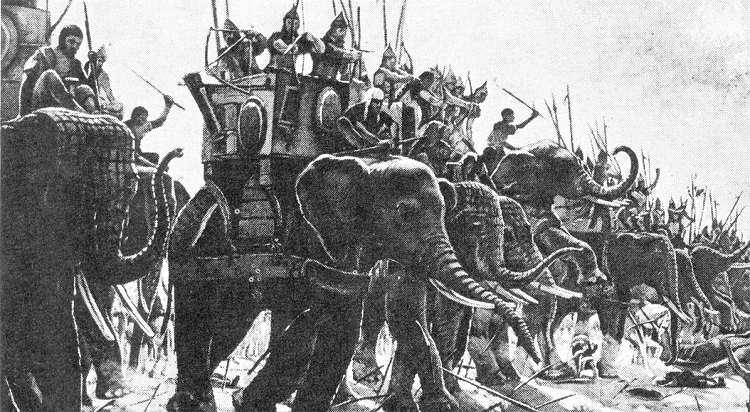

Photo Credit: historicnation.in
The battle is believed to have occurred around 1500 BCE in the region of the Sapta Sindhu (modern-day Punjab) in the Indian subcontinent. The Bharatas, led by King Sudas, were an Indo-Aryan tribe and considered to be the descendants of the legendary King Bharata. The ten kings were a confederation of various other tribes, including the Puru, Yadu, Turvasha, Anu, Druhyu, Alina, Paktha, Bhalanas, Siva, and Vishanin.
The battle was primarily fought over territorial disputes and control of the region. The Bharatas and their allies, the Tritsus, had settled along the Sarasvati River and sought to maintain their dominance. The ten kings, sensing an opportunity to expand their territories, challenged Sudas' authority and sought to overthrow him.
King Sudas:
Sudas was the ruler of the Bharatas and the chief commander of their army. He was described as a brave and intelligent king, chosen by the gods to lead his people.
Vishwamitra:
Vishwamitra was the revered sage and spiritual guide of King Sudas. He played a significant role in providing guidance and support to the Bharata army during the battle.
The Ten Kings:
The confederacy of ten kings was led by powerful rulers like Purukutsa, Anu, Druhyu, and others. They assembled their armies to challenge Sudas and his forces.
The battle was fierce and intense, with both sides employing various tactics and strategies. Sudas, with the help of Vishwamitra's wisdom, devised a plan to defeat the ten kings. They strategically positioned their troops, using the geography of the region to their advantage.
Sudas' army consisted of skilled charioteers, archers, and infantry. They fought valiantly, displaying their superior combat skills. The ten kings, although formidable opponents, were ultimately outmaneuvered and defeated by the Bharatas.
King Sudas emerged victorious in the Battle of the Ten Kings. The defeat of the confederacy established the supremacy of the Bharatas and solidified Sudas' rule over the region. Sudas' success in the battle is attributed to his bravery, strategic planning, and the support and guidance of Vishwamitra.
The Battle of the Ten Kings holds immense significance in Indian history and mythology. It is considered a crucial event that led to the consolidation of the Bharata tribes and their ascendancy in the Sapta Sindhu region. The battle also highlights the importance of intelligence, strategy, and divine intervention in determining the outcome of conflicts.
It is important to note that while the Battle of the Ten Kings is mentioned in the Rigveda, the historical accuracy and specific details of the battle are subject to interpretation and scholarly debate due to the limited available historical records from that era.